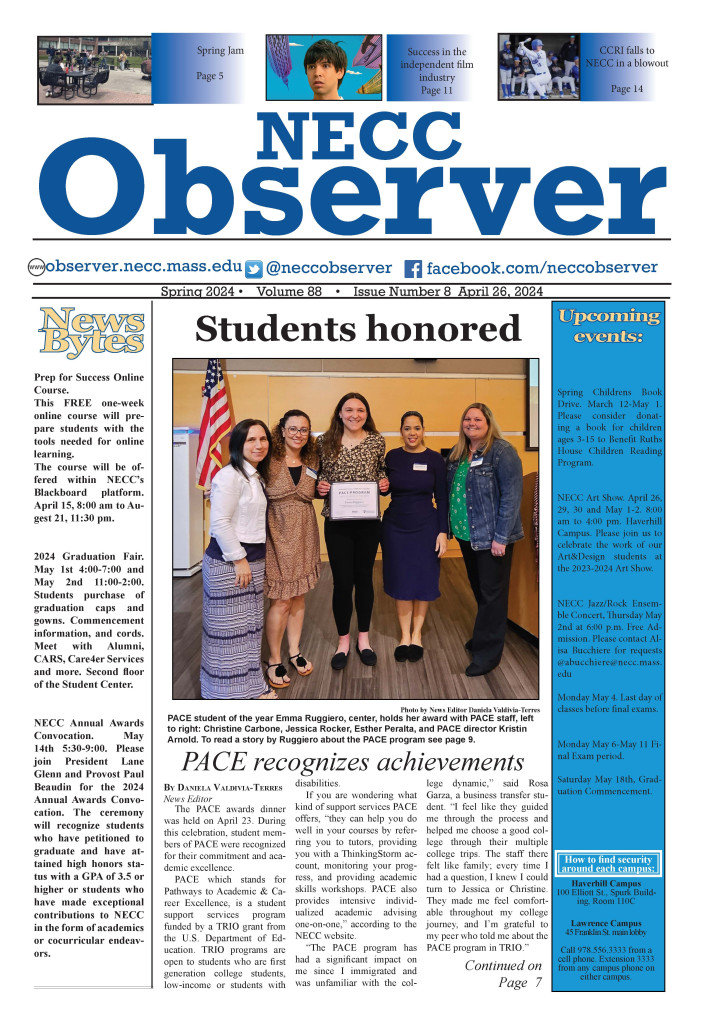The NECC Veterans and Service Person’s Organization held its first meeting on Friday, Oct. 3 at noon. The organization plans to meet bi-weekly in SC213 of the Behrakis One-Stop Center. Anyone is welcome to join the club.
There are a lot of veterans and service persons attending, working or teaching at NECC that are silent about their time in the service or their involvement in it.
A goal of this organization is to bring awareness of veterans’ presence on campus and provide a safe haven for them to talk about their experiences, both in the service and out of it, as well as their own personal college experiences at NECC.
The meeting started off by going over what the purpose of the organization is, which is to be a beneficial organization to all veterans, service persons and relatives. To provide information on benefits mandated by federal, state and private agencies, and to have group support, fellowship and comraderie.
The constitution of the organization was review during the meeting. It states that the club is open to everyone, and that the goal is to make people aware that there are veterans on campus.
During the meeting, attendees went around and introduced themselves as either a student or staff member, and their military experience. Once the formalities were finished, the veterans shared their experiences at NECC as well as some experiences in the military. A sense of comraderie could be felt among those in the room.
The club is run by Jeff Williams, an army veteran who is the Veteran Service Coordinator on campus, and Justin Merced, an English and Biology major at NECC. Merced is also an army veteran of 6, and he served in Iraq for 15 months and the infantry for 3 years. He finished his military career in the army reserves for 2 years.
Merced decided to get involved with the club because he had been in student senate, and the student leadership developer program, but he didn’t see much available for veterans.
“I thought to myself, there’s nothing for veterans here,” said Merced.
“I see vets walking around, and they’re silent just walking down the hallways going about their business, and I thought why not have a community where we can be ourselves, not just show up and leave.”
“My main goal for the clubs is to create a safe space for veterans and service members to come and ultimately have a space where they can be themselves, where they can talk about their own issues.” said Merced.
One of the main points discussed in the meeting was the lack of awareness about veterans on campus. This poses a problem for the club in particular. It cannot become a registered club at NECC unless there are at least 10 signatures on the sign up sheet.
Not only does this jeapordize the success of the club, but it contributes to the ongoing silence of veterans on campus.
If students and staff were more aware of the presence of veterans on campus, it may make for a better overall college experience for those veterans.
“Increasing visibility of veterans on campus is also a goal of mine, so people know we’re here, and so people ultimately respect the veteran community because we are here. Like I said before, it’s an invisible population,” said Merced.
“Honestly, it’s been pretty shoddy. I’ve had instances where I was pretty open about being a veteran. After just a matter of a few weeks I really stopped sharing it because people looked down on the military, and it’s a huge issue that I’ve run into with students and staff.”
Ideas were thrown around to help the club gain more popularity, such as introducing merchandise, like challenge coins, to establish identity.
They have a Veteran’s Appreciation Day with guest speakers. The challenge coins would be presented for academic achievement.
The club is limited by its lack of resources. The club hopes more involvement could helo them gain available resources, both human and capital. This could provide more opportunities for veterans and service people involved.
More funding could help provide future work study programs for veterans with the GI bill and other potential fun gatherings for veterans and their families who are a part of the club.
Another point mentioned in the meeting is that there are veterans that work full time during the day and take classes at night, so it is more difficult for them to get involved with the club if they desired to.
Jeff Williams who is the advisor of the club, stressed that a goal of the club is make the Veteran Center, located in the Behrakis One-Stop Center SC216, a comfortable space for veterans to hang out and do homework or just unwind.
“Don’t feel like you can’t come in there and hang out just because I’m working. The space is for the veterans on campus, and I just happen to work in there. That’s the message that we want to send. The more traffic that we get, the more it reinforces that message so that people will take advantage of the space,” said Williams.

